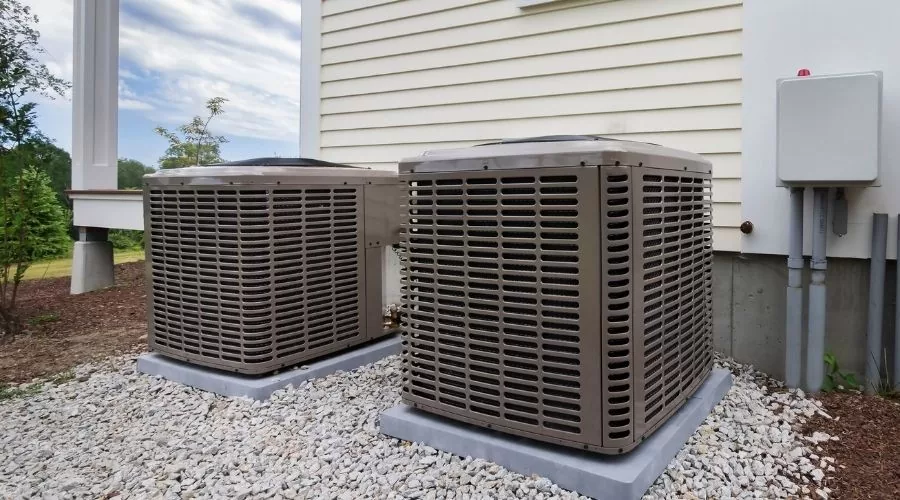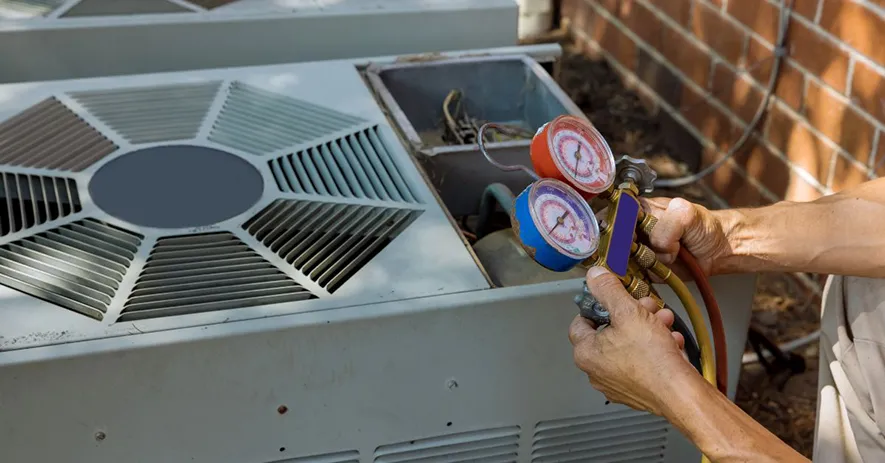As the cold weather sets in, understanding the intricacies of your heat pump's performance becomes crucial. In this post, we're diving into the world of heat pumps during the winter season, focusing on two key categories: the common issues that many homeowners are likely familiar with, and the lesser-known problems that often go unnoticed.
From the frosty challenges on the outdoor unit to the subtle nuances of thermostat calibration, we'll cover the top five issues in each category. This comprehensive approach aims to equip you with the knowledge to navigate both the expected and the unexpected, ensuring your heat pump operates efficiently throughout the colder months.
Whether you're troubleshooting a current problem or just keen to learn more, this guide is your go-to resource for all things heat pumps in cold weather.
Common Heat Pump Problems in Cold Weather
As the winter chill deepens, even the sturdiest heat pumps may start showing signs of distress.
In this section, we'll delve into the five most common issues you may encounter with your heat pump as temperatures drop. These issues are familiar to many homeowners and serve as the first line of inquiry when troubleshooting heat pump performance in cold weather. Understanding these challenges is key to quick diagnostics and effective solutions, keeping your home warm and comfortable.
Frost Build-Up on the Outdoor Unit
One of the telltale signs of winter's impact on heat pumps is the frost that accumulates on the outdoor unit. This isn't merely a cosmetic problem; it affects performance as well. In normal operation, a thin layer of frost is expected and managed through the heat pump's defrost cycle. However, when this frost builds up excessively, it acts like an insulating blanket, hampering the unit's ability to absorb heat from the outside air.
This obstruction can considerably diminish the efficiency of your heat pump, compelling it to work harder and consume more energy to uphold the desired indoor temperature. Regular checks of the outdoor unit for excessive frost build-up, especially during peak winter months, can help in early identification and resolution of potential efficiency issues.
Struggling to Heat in Extremely Low Temperatures
Heat pumps are champions of energy efficiency, but they have their kryptonite – extremely low outdoor temperatures. As the temperature drops, the heat pump's ability to extract warmth from the outside air decreases. This is because the heat in the air becomes less available, making the extraction process more challenging.
In such conditions, the heat pump may struggle to provide sufficient heating, or may resort to using more energy-intensive auxiliary heating elements to keep up. This decrease in efficiency can be particularly noticeable in climates that experience severe cold snaps. Being aware of your heat pump’s limitations in extreme cold can help in planning for supplemental heating solutions or considering heat pumps designed for colder climates.
Emergency Heat Mode Activation in Cold Conditions
A lesser-known yet vital aspect of heat pump operation in cold weather is the activation of the emergency heat mode. This mode, commonly known as 'auxiliary heat,' activates when the heat pump is unable to extract enough warmth from the chilly outdoor air.
While this mode ensures your home stays warm, it comes at a cost – efficiency. Emergency heat typically depends on electric resistance heating, which is significantly less energy-efficient than the heat pump's normal operation. This switch can lead to a noticeable spike in energy consumption during particularly cold spells.
Understanding when and why your heat pump resorts to this mode can help in managing its impact on your energy bills and exploring more efficient heating solutions for extreme conditions.
The Challenges of a Malfunctioning Defrost Cycle
The defrost cycle in a heat pump is an unsung hero, quietly working to ensure efficiency isn't compromised by frost accumulation. However, if this cycle malfunctions, the repercussions can be significant.
A faulty defrost cycle means that frost can build up unchecked on the outdoor unit, leading to a drop in heating efficiency and potentially causing long-term damage to the unit. This malfunction can manifest in various ways – from the cycle not activating at all to it running too frequently or for too long.
Regular maintenance checks can help detect and correct any issues with the defrost cycle, ensuring that your heat pump operates smoothly throughout the cold season.
Understanding Noisy Operation in Cold Weather
As the temperature drops, you might notice your heat pump making more noise than usual. The heightened noise level in cold weather can be attributed to various factors.
One common reason is the defrost cycle, which can cause temporary but noticeable sounds as the system shifts modes. Additionally, the natural expansion and contraction of metal parts in fluctuating temperatures can lead to unusual sounds.
While some noise level increase is normal, excessively loud or strange noises should not be ignored, as they can indicate potential issues with the heat pump's components. Keeping an ear out for these changes in noise can be an early signal for a need for maintenance or repair.
Now that we've walked through the most common heat pump problems in cold weather, you're better equipped to identify and address these issues as they arise. Regular maintenance and timely interventions are your best defense against these familiar challenges. Keep these points in mind to ensure your heat pump continues to function efficiently and reliably through the cold months.
Lesser-Known Heat Pump Problems in Cold Weather
Beyond the obvious, there are several lesser-known problems that can affect heat pump performance in cold weather. This section delves into five such issues that might not be top of mind but are equally crucial to recognize and address. These challenges may be less apparent, but their impact on your heat pump's efficiency and your home's comfort can be significant. Let's unveil these concealed issues to provide you with a comprehensive understanding of what to watch for in winter.
Thermostat Calibration Issues in Cold Weather
In the intricate dance between your heat pump and home comfort, the thermostat plays a pivotal role. However, during the cold months, thermostat calibration issues can lead to a misstep. If the thermostat is miscalibrated, it may not accurately gauge the indoor temperature, leading to inefficient heating. This miscommunication means your heat pump could be working overtime to reach a temperature that the thermostat inaccurately reports, or it might not kick in when needed.
In either scenario, the result is a less comfortable home and potentially higher energy bills. Regular checks and recalibration, particularly as the season changes, can ensure your thermostat accurately reflects the true ambiance of your home, allowing your heat pump to respond appropriately.
Refrigerant Pressure Fluctuations Impacting Performance
The refrigerant serves as the lifeblood of your heat pump, circulating to facilitate the transfer of heat in and out of your home. However, were you aware that cold weather can disrupt the balance of this crucial component? As temperatures drop, the refrigerant pressure can fluctuate, which may impact the efficiency of the heat exchange process.
Low outdoor temperatures can cause the refrigerant to contract, reducing its pressure and potentially triggering safety mechanisms that shut down the heat pump. These fluctuations can lead to a heat pump that struggles to keep up with heating demands or even stops working temporarily. Understanding this dynamic can help in diagnosing issues that arise in colder weather and in taking proactive steps, such as ensuring the refrigerant is at the correct level and the system is well-maintained.
Condensate Drain Freeze-ups in Cold Weather
An often-overlooked aspect of heat pump operation in winter is the potential for condensate drain freeze-ups. During the defrost cycle, your heat pump works to remove ice from the outdoor unit, producing water as a byproduct. In colder weather, the water in the condensate drain line can freeze, resulting in blockages.
These blockages can lead to water backing up, potentially causing damage to the system and impacting the efficiency of the heat pump. Preventative measures, such as insulating the condensate line or installing a drain line heater, can be effective in mitigating this risk, ensuring that your heat pump continues to operate smoothly, even during the depths of winter.
Reduced Indoor Air Quality in Heated Environments
During winter, we often keep our homes tightly sealed to retain heat, but this can inadvertently lead to a decline in indoor air quality. The constant operation of heat pumps in closed environments can result in stale air, as there is limited fresh air circulation.
Additionally, heating systems have the potential to agitate and circulate dust, allergens, and various particles. This issue is particularly pertinent for households that rely on heat pumps for continuous heating. To combat this, consider integrating air purification systems, increasing ventilation when possible, and regularly replacing or cleaning heat pump filters to maintain a healthy indoor environment.
Sensitivity of Electrical Components in Cold Temperatures
The electrical components of heat pumps, such as capacitors and contactors, can be sensitive to cold temperatures. In winter, these components may operate under increased stress, making them more prone to malfunctions.
Cold weather can result in the contraction of materials, potentially causing loose electrical connections or reduced efficiency in electrical circuits. Awareness of this sensitivity is key, as it underscores the importance of regular winter maintenance checks. Ensuring that electrical connections are secure and components are in good condition can help prevent unexpected breakdowns in cold weather.
Having explored the lesser-known issues your heat pump may face in cold weather, you now have a deeper insight into the subtleties of winter maintenance. These challenges may not be as immediately recognizable, but being aware of them puts you a step ahead in ensuring the longevity and efficiency of your system. Remember, sometimes the smallest signs lead to the most significant improvements in performance and comfort.
Preventive Maintenance Tips for Heat Pumps in Cold Weather
As winter wraps its cold fingers around your home, your heat pump becomes a crucial line of defense against the chill. To guarantee efficient and effective operation, proactive maintenance is crucial. Here are some essential tips to maintain your heat pump in top condition during the colder months:
- Regular Filter Checks and Replacements: One of the simplest yet highly effective maintenance tasks is to consistently check and replace the air filters. Clogged or dirty filters can impede airflow and diminish the efficiency of the system. During winter, filters may need more frequent attention due to increased usage.
- Outdoor Unit Inspection and Cleaning: Ensure the outdoor unit remains free from snow, ice, and debris. A buildup of frost is normal, but excessive ice can be a sign of a problem. Gently remove any snow or ice accumulation and ensure the area around the unit is clear of leaves and debris to maintain optimal airflow.
- Monitoring the Defrost Cycle: Be aware of how your heat pump's defrost cycle operates. If you notice the cycle isn't functioning as it should – either not activating when needed or running too frequently – it may be time to call in a professional.
- Scheduling Professional Servicing: Before the onset of winter, consider scheduling a professional servicing of your heat pump. An experienced technician can perform a comprehensive inspection and address any issues, including refrigerant levels, electrical connections, and the condition of the coils and components.
- Insulating Exposed Ductwork: If any ductwork runs through unheated spaces, ensure it's well insulated. Effective insulation aids in maintaining the temperature of the air as it travels through the ducts, enhancing overall efficiency.
- Checking and Sealing Leaks: Make sure your home is properly sealed by inspecting for drafts around windows and doors. Sealing leaks can prevent cold air from entering and warm air from escaping, reducing the workload on your heat pump.
- Thermostat Settings and Calibration: Keep an eye on your thermostat. Verify its calibration and consider setting it to a consistent temperature to prevent overburdening the heat pump.
- Preparing for Extreme Cold: In anticipation of extreme cold spells, have a backup plan. This might include supplemental heating sources or additional insulation measures to ease the burden on your heat pump.
- Condensate Drain Maintenance: To prevent freeze-ups in the condensate drain, make sure it's clear of any obstructions. In areas with severe cold, consider installing drain line heaters as an extra precaution.
- Understanding Your System's Limitations: Recognize the limitations of your heat pump in extremely cold weather and adjust your usage accordingly. Straining the system in conditions it is not designed for can result in inefficiency and potential damage.
By following these preventive maintenance tips, you can enhance the performance and longevity of your heat pump throughout the cold season, ensuring your home remains a cozy haven against the winter chill.
Understanding and Troubleshooting Heat Pump Defrost Cycles
In the heart of winter, your heat pump faces the challenge of not just heating your home but also maintaining its efficiency in icy conditions. This is where the defrost cycle becomes crucial. Understanding this function, how to identify issues, and ways to troubleshoot them can be key in ensuring your heat pump's optimal performance during cold months.
The Importance of the Defrost Cycle
The purpose of the defrost cycle in a heat pump is to inhibit the buildup of frost on the coils of the outdoor unit. Accumulation of frost is a regular event in cold weather, given that the unit extracts heat from the outside air. However, excessive frost can insulate the coils and hinder the heat transfer process, reducing the efficiency and effectiveness of the heat pump.
How the Defrost Cycle Works
- Sensing Frost: The heat pump detects frost build-up on the outdoor coils through sensors.
- Initiating the Cycle: Once a certain level of frost is detected, the heat pump temporarily reverses its operation, sending warm refrigerant through the outdoor coils.
- Melting the Frost: This process melts the frost, clearing the coils and allowing normal heating operation to resume.
- Cycle Completion: The heat pump switches back to its normal heating mode after the frost is cleared.
Common Issues and Troubleshooting Tips
- Excessive Frost Build-Up: If you notice that frost is not being cleared during the defrost cycle, it could be a sign of a malfunction. Possible causes include sensor issues, faulty control valves, or problems with the reversing valve.
- Frequent Defrost Cycles: If the defrost cycle is activating more frequently than usual, it may indicate issues like low refrigerant levels, improper airflow, or malfunctioning sensors.
- Prolonged Defrost Cycles: Cycles that last too long can reduce heating efficiency. This might be due to system malfunctions, incorrect sensor readings, or issues with the defrost control.
- Strange Noises During Defrost: Unusual sounds during the defrost cycle could point to mechanical issues, such as problems with the reversing valve or fan motors.
- Continued Operation in Cold Weather: A properly functioning defrost cycle will ensure that the heat pump can continue to operate effectively, even in cold temperatures.
Signs of a Malfunctioning Defrost Cycle
- The outdoor unit is covered in ice or frost for extended periods.
- The heat pump switches to emergency heat mode too frequently.
- Noticeable decline in heating efficiency or increased energy consumption.
- Unusual noises or behaviors during the defrost cycle.
If you have concerns about the defrost cycle, it's usually advisable to seek guidance from a professional. They can conduct a thorough diagnosis and address complex issues that might be affecting the cycle's operation.
Energy Efficiency and Heat Pumps in Winter
While heat pumps are renowned for their efficiency, the cold winter weather poses unique challenges that can impact their performance. Understanding how to optimize your heat pump's operation during these months is key to enjoying consistent warmth without incurring excessive energy costs.
Key Strategies for Enhanced Efficiency
- Optimal Thermostat Settings: Contrary to intuition, setting your thermostat to a moderately constant temperature can be more energy-efficient than frequently adjusting it. Sudden increases in temperature can trigger the heat pump to switch to less efficient emergency heat modes. A steady setting helps maintain a balance between comfort and energy consumption.
- Regular Maintenance Checks: As mentioned in earlier sections, it is crucial to ensure that your heat pump is in optimal condition. This includes regular checks on the defrost cycle, filter cleaning or replacement, and ensuring that the outdoor unit is free from ice and debris build-up.
- Utilize Smart or Programmable Thermostats: Smart thermostats can optimize your heating schedule based on your daily routine, reducing energy usage when you’re not home while ensuring comfort when you are. They can also offer valuable insights into your heating patterns and propose adjustments for improved efficiency.
- Seal and Insulate Your Home: Proper insulation and sealing of drafts can significantly reduce the workload on your heat pump. By retaining more heat indoors, the heat pump doesn't have to work as hard to sustain a warm temperature, resulting in lower energy usage.
- Supplemental Heating Sources: In extremely cold temperatures, using supplemental heating sources in high-usage areas can alleviate some of the strain on your heat pump. This can be especially effective in homes with expansive open spaces or inadequate insulation.
Understanding the Balance Between Heat Pump Limitations and Efficiency
Heat pumps are engineered to operate efficiently across a range of temperatures. However, in extremely cold weather, their efficiency can decrease as they work harder to extract heat from the cold air. Recognizing the limitations of your heat pump in severe weather conditions is crucial. In such scenarios, balancing the use of the heat pump with alternative heating methods can help maintain efficiency and prolong the lifespan of the unit.
Monitoring and Adjusting for Peak Performance
Regularly monitoring your energy consumption and observing how your heat pump performs in different weather conditions can provide insights into optimal usage patterns. Adjustments might be necessary as the season progresses and temperatures fluctuate.
In summary, while heat pumps are an efficient heating solution, their performance in winter requires a careful balance of maintenance, smart usage, and understanding their operational limitations. By following these strategies, you can ensure that your heat pump remains a cost-effective and efficient source of warmth throughout the winter season, providing comfort and energy savings in equal measure.
Secure Peak Heat Pump Performance with Sunset Heating & Cooling
As we wrap up our journey through the intricacies of heat pump maintenance and efficiency in cold weather, it's clear that understanding and proactive care are vital in navigating these winter challenges. From managing frost build-up to optimizing energy efficiency, each aspect plays a pivotal role in ensuring your home remains a warm and inviting haven during the colder months.
At Sunset Heating & Cooling, we're not just about providing solutions; we're about forging partnerships in comfort and efficiency. Our team of experts is well-versed in the unique demands placed on heat pumps during the Portland winter. We're committed to offering top-notch service, whether it's conducting detailed maintenance checks, troubleshooting complex issues, or offering advice on maximizing efficiency.
While taking preventive measures at home is beneficial, the expertise and experience of a professional team like Sunset Heating & Cooling are indispensable for the health and optimal performance of your heat pump. With us, you acquire more than just a service provider; you gain a partner dedicated to ensuring the seamless operation of your heating system throughout the winter.
For that added assurance and expert care your heat pump needs, especially when the temperatures dip, don't hesitate to call Sunset Heating & Cooling at (503) 500-5866. Let us be your trusted ally in keeping your home cozy, efficient, and well-heated, no matter what the winter brings.







